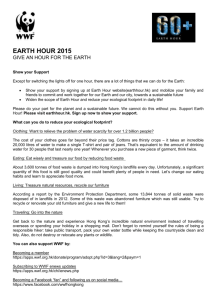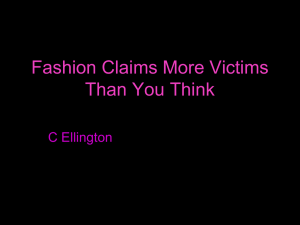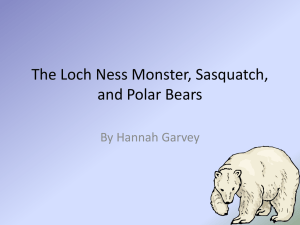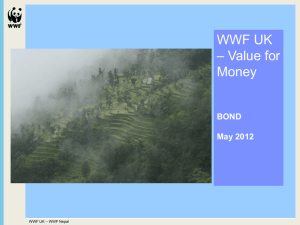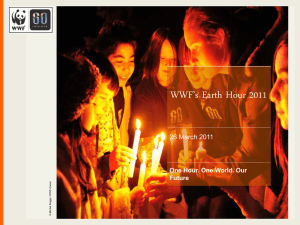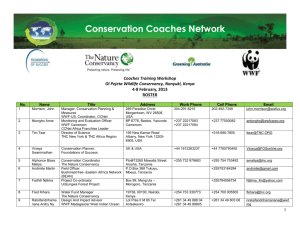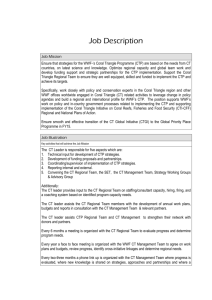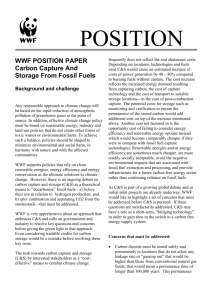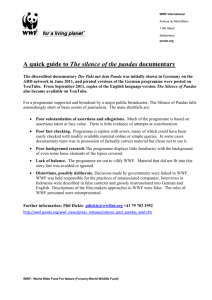Revised targets integrated in the Zero Draft
advertisement
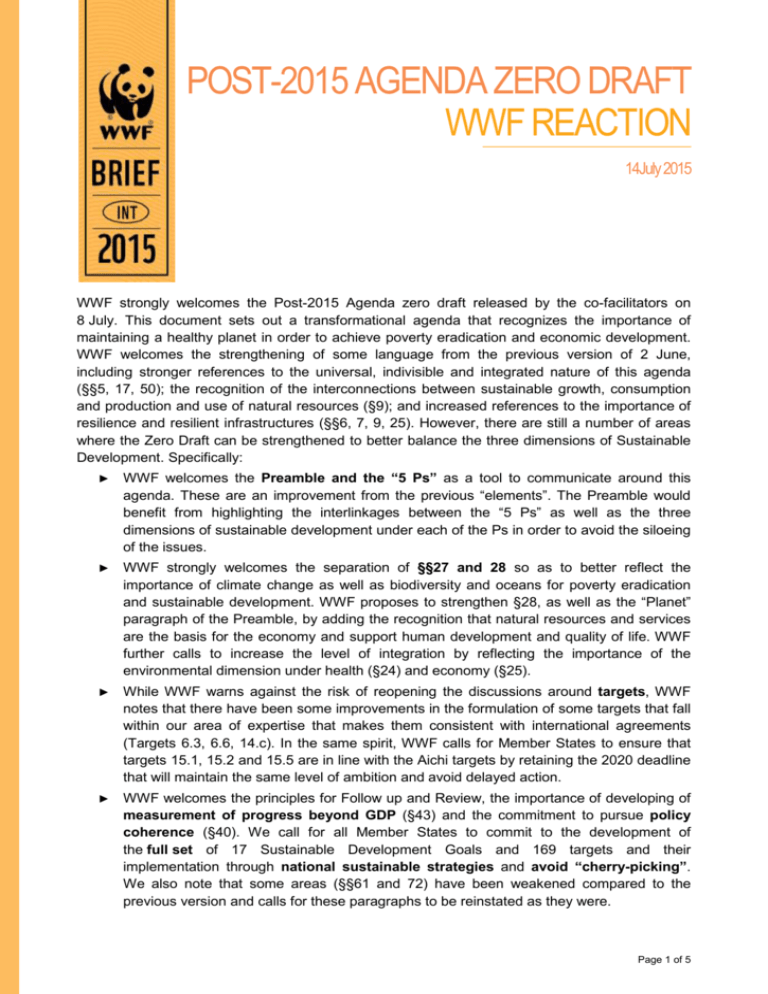
POST-2015 AGENDA ZERO DRAFT WWF REACTION 14July 2015 WWF strongly welcomes the Post-2015 Agenda zero draft released by the co-facilitators on 8 July. This document sets out a transformational agenda that recognizes the importance of maintaining a healthy planet in order to achieve poverty eradication and economic development. WWF welcomes the strengthening of some language from the previous version of 2 June, including stronger references to the universal, indivisible and integrated nature of this agenda (§§5, 17, 50); the recognition of the interconnections between sustainable growth, consumption and production and use of natural resources (§9); and increased references to the importance of resilience and resilient infrastructures (§§6, 7, 9, 25). However, there are still a number of areas where the Zero Draft can be strengthened to better balance the three dimensions of Sustainable Development. Specifically: ► WWF welcomes the Preamble and the “5 Ps” as a tool to communicate around this agenda. These are an improvement from the previous “elements”. The Preamble would benefit from highlighting the interlinkages between the “5 Ps” as well as the three dimensions of sustainable development under each of the Ps in order to avoid the siloeing of the issues. ► WWF strongly welcomes the separation of §§27 and 28 so as to better reflect the importance of climate change as well as biodiversity and oceans for poverty eradication and sustainable development. WWF proposes to strengthen §28, as well as the “Planet” paragraph of the Preamble, by adding the recognition that natural resources and services are the basis for the economy and support human development and quality of life. WWF further calls to increase the level of integration by reflecting the importance of the environmental dimension under health (§24) and economy (§25). ► While WWF warns against the risk of reopening the discussions around targets, WWF notes that there have been some improvements in the formulation of some targets that fall within our area of expertise that makes them consistent with international agreements (Targets 6.3, 6.6, 14.c). In the same spirit, WWF calls for Member States to ensure that targets 15.1, 15.2 and 15.5 are in line with the Aichi targets by retaining the 2020 deadline that will maintain the same level of ambition and avoid delayed action. ► WWF welcomes the principles for Follow up and Review, the importance of developing of measurement of progress beyond GDP (§43) and the commitment to pursue policy coherence (§40). We call for all Member States to commit to the development of the full set of 17 Sustainable Development Goals and 169 targets and their implementation through national sustainable strategies and avoid “cherry-picking”. We also note that some areas (§§61 and 72) have been weakened compared to the previous version and calls for these paragraphs to be reinstated as they were. Page 1 of 5 ► WWF calls for Member States to ensure that the Introduction (§3) clearly reflects the dual agenda of poverty eradication and sustainable development on equal footing and as mutually reinforcing elements. ► WWF suggests that all references to “sustained economic growth” are replaced by “inclusive sustainable economic development” (Prosperity, §§3, 9, 16, 20, 25). This would better reflect the importance of moving to a fundamentally different model of economic development that does not only focus on increasing production and productivity to achieve the ambition of this agenda. ► WWF suggests that all references to “modern energy” are replaced by “clean, sustainable and renewable energy services” (Prosperity, §25) and to reinstate references to “environmentally sound technologies” (§32). We look forward to working with all Member States and partners to support this vision ahead of the Summit, and to play our part in the implementation of this new agenda. PROPOSED TEXT CHANGES Title WWF proposes “Securing Our Future: The 2030 Agenda for Global Sustainable Development” in order to ensure that the title reflects the true ambition of this agenda. Preamble ► […] We are resolved to free the human race from the tyranny of poverty and want and to heal and secure our planet for present and future generations. We recognize that these objectives are inextricably linked. We are determined to take the bold and transformative steps needed to shift the world on to a sustainable path. ► […] The 17 Sustainable Development Goals and 169 targets which we are announcing demonstrate the scale and ambition of the new universal Agenda. They are integrated and indivisible and will stimulate action by all countries and stakeholders over the next fifteen years in the following areas of critical importance for humanity and the planet. People ► […] We want to end poverty in all its forms; end hunger and malnutrition; promote human dignity; combat inequalities in and between countries; achieve gender equality and empower all women and girls; ensure quality education, water and sanitation, and a healthy life and environment, as well as equal access to natural resources for all; and secure the participation of all people and groups, including children, in the realization of the new Goals and targets. Planet ► […] We want to protect the planet and sustainably and equitably manage its resources so that it can support the needs of present and future generations. We recognize that nature and the services our planet provides underpin the economy, human development and quality of life. […] Prosperity ► We want all human beings to enjoy the fruits of economic, social and technological progress and live productive and fulfilling lives while safeguarding our common home. We want to ensure sustained, inclusive and sustainable economic growth development; promote decent work and employment for all; foster shared prosperity and sustainable lifestyles worldwide; promote sustainable industrialization, agriculture and infrastructure; and ensure access to affordable, sustainable, clean and renewable modern energy services. Page 2 of 5 Specific paragraphs §3 – We recognize that This agenda is the international community’s commitment to poverty eradication and is the greatest global challenge and indispensable requirement for sustainable development. […] We intend, between now and 2030, to […] ensure the lasting protection of the planet and its resources; to change unsustainable and promote sustainable patterns of consumption and production; and to create conditions for sustainable, inclusive and sustained equitable economic development growth and shared prosperity. §13 - [...] But the progress has been uneven, particularly in Africa and least developed countries, and some of the MDGs remain off- track, in particular those related to maternal, newborn and child health, environmental sustainability [...] §17 – […] We are setting out together on the path towards sustainable and inclusive development, devoting ourselves collectively to the pursuit of global development and of “win-win” cooperation which can bring huge gains to all countries and all parts of the world. […] §19 – […] Women and girls must enjoy equal access to education, economic resources and political participation as well as equal opportunities with men and boys for employment and leadership as well as equal access to natural resources. […] §20 – [...] All of us will work We commit to implement the full Agenda within our own countries and at the regional and global levels. [...] §24 – […] We commit to accelerating the progress made to date in reducing infant, child and maternal mortality by ending all preventable deaths of infants, children and pregnant women by 2030. We also commit to reducing the number of deaths and illness from hazardous chemicals and air, water and soil pollution and contamination. […] We recognize the challenges generating from climatic and environmental change for controlling diseases such as malaria, HIV/AIDS, tuberculosis and other communicable diseases and epidemics, and will equally accelerate the pace of progress made in fighting such diseases malaria, HIV/AIDS, tuberculosis and other communicable diseases and epidemics, including by protecting biodiversity and genetic diversity. At the same time we are committed to devoting greater effort to tackling non-communicable diseases. §25 – […] Sustained, inclusive and sustainable economic growth development is essential for prosperity. This will only be possible if wealth is shared through progressive policies aimed at redistribution and if progress is measured in more than just economic terms. […] We will therefore adopt policies which increase productivity and productive employment, financial inclusion, agricultural and industrial development, sustainable transport systems and affordable, sustainable, clean and renewable modern energy provision and which build resilient infrastructure. §27 – We will address decisively the threat posed by climate change and environmental degradation. The global nature of climate change calls for the widest possible international cooperation aimed at accelerating the reduction phase out of global greenhouse gas emission to keep the rise in global average temperature well below 1.5 or 2 degree Celsius above pre-industrial level. Looking ahead to the COP 21 conference in Paris in December, we underscore the responsibility of all States to work for a meaningful and universal climate agreement which will stabilize greenhouse gas concentrations in the atmosphere at a level that would prevent dangerous anthropogenic interference with the climate system, which will provide adequate support for climate adaptation and address loss and damage resulting from climate change impacts in particularly for vulnerable developing countries. §28 – We recognise that natural resources, nature and the services it provides underpin the economy, human development and the quality of life. We are determined also to conserve and sustainably use oceans and seas, protect biodiversity, ecosystems and wildlife, Page 3 of 5 promote sustainable tourism, tackle water scarcity, desertification, land degradation and drought and promote resilience and disaster risk reduction. §29 - We recognize that sustainable urban development and management are crucial to the quality of life of our people. We will work with local authorities and communities to renew and plan our cities and human settlements so as to foster community cohesion and personal security and to stimulate environmentally sound policies, innovation and employment. We will reduce the negative impacts of urban activities, including through the safe management and use of chemicals, the reduction and recycling of waste and, more efficient use of water and energy and the protection of ecosystems providing for the services that people living in cities consume. […]. §30 - Factors which give rise to violence, insecurity and injustice, such as corruption, depletion of natural resources, poor governance and illicit financial and arms flows, are addressed in the Agenda. §32 – […] We recognize that these will involve the mobilization of financial resources as well as capacity-building, the transfer of environmentally sound technologies as mutually agreed and a wide range of other supportive policies and measures such as the elimination of environmentally harmful subsidies. […] Business, the private sector and philanthropic organizations, in line with existing international principles and standards for environment sustainability and human rights, will also make important contributions to resource mobilization and implementation of the Agenda. §42 – Our Governments have the primary responsibility for follow-up and review, at the national, regional and global levels, in relation to the progress made in implementing the full set of goals and targets over the coming fifteen years. [...] §50 – […] Targets are defined as aspirational and global, with each government setting its own national targets guided by the global level of ambition but taking into account national circumstances. All governments will work towards the achievement of all goals and targets. §61 – WWF supports the text from the Zero draft 2 June Section III paragraph 5 to be reinstated, as it provides clear timelines and stresses the need for good quality reviews. “Each member state could, at least once every four years, conduct robust and inclusive reviews of progress, based on a publicly available government progress report and complemented by contributions from civil society, academia, local government, the UN system, private sector and other actors. National Parliaments can play an important role in review processes as well as other national institutions such as National Sustainable Development Councils and local authorities.” §72 - We request the Secretary General to prepare guidelines for national reports and review processes and to provide a proposal, for consideration by member states, on the organizational arrangements of state-led reviews at the HLPF under the auspices of ECOSOC, including on a possible common reporting format. […]. Annex 1: Remaining proposal for target revision WWF welcomes the proposed revision of target 14.c as it makes it consistent with the annual GA omnibus resolution on oceans and the law of the sea. Page 4 of 5 REVISED TARGETS INTEGRATED IN THE ZERO DRAFT WWF recognizes the improvement in the formulation of some of the revised targets that fall within our area of expertise (6.3, 6.6). However, WWF believes that some of the revised targets now integrated still need to be made consistent with international commitments. While warning against the risk of reopening the discussions around targets, WWF calls upon Member States to ensure that the level of ambition is not lowered and actions on the following targets are not delayed. Goal 11 Target 11.b By 2020, substantially increase by at least 60% the number of cities and human settlements adopting and implementing integrated policies and plans towards inclusion, resource efficiency, mitigation and adaptation to climate change, resilience to disasters, develop and implement, in line with Sendai Framework for Disaster Risk Reduction 2015-2030, holistic disaster risk management at all levels. Rationale: UN Habitat supports a 50% increase in the number of cities adopting and implementing inclusive national urban policies on Disaster Risk Reduction (DRR). Since this target covers integration across mitigation, adaptation and resource efficiency among others, WWF suggest replacing the [x] with the numerical value “by at least 60%” (existing agreements: UN Habitat proposal to SDGs and their ongoing contributions). Goal 15 Target 15.1 Ensure the conservation, restoration and sustainable use of terrestrial and inland freshwater ecosystems and their services by 2020, in particular forests, wetlands, mountains and drylands, in line with obligations under international agreements, with increased efforts until 2030 and take further action as needed by 2030. Rationale: WWF strongly suggests replace the last sentence with the formulation suggested in the text changes column to ensure continued and effective action through 2030. Target 15.2 By 2020, promote the implementation of sustainable management of all types of forests, and by 2030, halt deforestation, and restore degraded forests, substantially increase afforestation, and increase reforestation by 350 million hectares globally. Rationale: WWF recommends replacing the [x] with “by 350 million hectares” as per the New York Declaration on Forests in 2014. This value is measurable, ambitious, and endorsed by governments, companies, civil society and indigenous peoples. The proposed edits are intended to indicate that the three actions – of restoration, afforestation and reforestation – should reach 350 million hectares by 2030. Target 15.5 Take urgent and significant action to reduce the degradation and fragmentation of natural habitats, halt the loss of biodiversity and, by 2020, protect and prevent the extinction of threatened species, with increased efforts until 2030 and take further action as needed by 2030. Rationale: WWF also welcomes the alignment with the Aichi Targets timeframe and the recognition that further action is needed by 2030. However, WWF strongly suggests replacing the last sentence with the suggested formulation to ensure continued and effective action through 2030. Page 5 of 5
